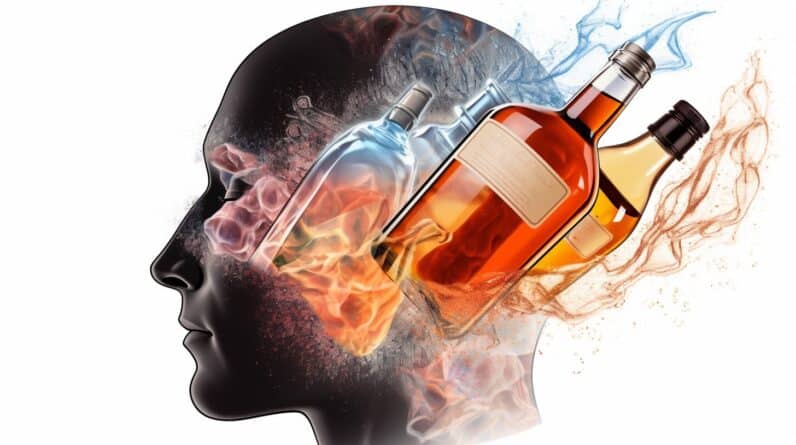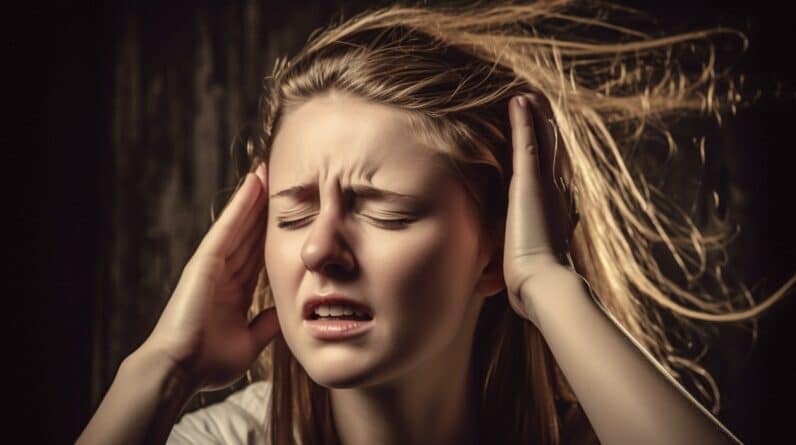
We may earn money or products from the companies mentioned in this post.
As an Amazon Associate I earn from qualifying purchases.
Table Of Contents
Introduction to Alcohol Withdrawal Tinnitus
Alcohol withdrawal tinnitus is a condition characterized by ringing, buzzing, or other noises in the ears during or after quitting alcohol consumption. It is a prevalent and concerning symptom experienced by many individuals undergoing alcohol withdrawal. By understanding and managing this condition, affected individuals can find relief and improve their quality of life.
Alcohol Withdrawal: An Overview
Alcohol withdrawal is a set of physical and psychological symptoms experienced by individuals who stop or significantly reduce their alcohol consumption after a period of heavy or prolonged use. Factors contributing to withdrawal symptoms include the person’s history of alcohol consumption, duration of drinking, and overall health. Alcohol withdrawal typically occurs in three stages: mild, moderate, and severe. Each stage may present with different symptoms, varying in intensity and duration.
It is crucial for individuals experiencing alcohol withdrawal to seek professional help, as untreated withdrawal can lead to life-threatening complications. Medical professionals can provide guidance, support, and appropriate treatments to ease withdrawal symptoms, including alcohol withdrawal tinnitus.
Alcohol Withdrawal Tinnitus: Causes and Factors
There is a complex relationship between alcohol and tinnitus. Excessive alcohol consumption can lead to changes in the brain’s neurotransmitter levels, affecting auditory processing and resulting in tinnitus. Additionally, alcohol can cause damage to the auditory system, including the inner ear hair cells responsible for transmitting sound signals to the brain.
American Tinnitus Association – Understanding the Facts explains that alcohol withdrawal tinnitus may result from an imbalance in neurotransmitters, such as glutamate and GABA, during the withdrawal process. This imbalance can cause over-excitation of the auditory system and contribute to the development of tinnitus.
How Long Does Alcohol Withdrawal Tinnitus Last?
The duration of alcohol withdrawal tinnitus varies from person to person, depending on several factors. These factors include the severity of withdrawal symptoms, the individual’s history of alcohol use, and the presence of any underlying health conditions that may affect auditory function.
Typically, alcohol withdrawal tinnitus may last from a few days to a few weeks. However, in some cases, it can persist for months or even become a chronic condition. It is essential for individuals experiencing alcohol withdrawal tinnitus to seek medical assistance, as proper treatment and management can help alleviate symptoms and improve their quality of life.
National Institute on Alcohol Abuse and Alcoholism – Alcohol Withdrawal Syndrome highlights the importance of addressing alcohol withdrawal symptoms, including tinnitus, to promote long-term recovery and prevent potential complications.
Symptoms and Diagnosis of Alcohol Withdrawal Tinnitus
Alcohol withdrawal tinnitus is often accompanied by a range of symptoms, including ringing, buzzing, hissing, or clicking noises in the ears. These sounds may vary in pitch and volume and can be continuous or intermittent. In some cases, individuals may also experience sensitivity to sound, difficulty concentrating, and sleep disturbances due to the bothersome nature of the noises.
Differentiating between alcohol withdrawal tinnitus and other forms of tinnitus is essential for proper diagnosis and treatment. Other types of tinnitus may have different underlying causes, such as exposure to loud noise, ear infections, or Meniere’s disease. A thorough medical evaluation, including a detailed history of alcohol use and withdrawal symptoms, is crucial for identifying the root cause of tinnitus and developing an appropriate treatment plan.
Harvard Health Publishing – Tinnitus: Ringing in the ears and what to do about it highlights the importance of obtaining a comprehensive medical assessment to determine the cause of tinnitus and tailor treatment accordingly.
Treating Alcohol Withdrawal Tinnitus
Addressing the root cause of alcohol withdrawal tinnitus is vital for successful treatment. This may involve a combination of medical interventions and lifestyle modifications to manage withdrawal symptoms and reduce alcohol dependence. Medical treatments for alcohol withdrawal tinnitus may include medications that help restore neurotransmitter balance, alleviate anxiety, or improve sleep quality.
Some medications that may help manage tinnitus symptoms during alcohol withdrawal include:
– Will CBD Gummies Help with Tinnitus?
– Can Magnesium Help with Tinnitus?
– Does Zinc Help with Tinnitus?
Natural and Home Remedies for Tinnitus
In addition to medical treatments, several natural and home remedies can help alleviate tinnitus symptoms during alcohol withdrawal. These remedies can be used in conjunction with medical treatments under the guidance of a healthcare professional.
- Is There a Home Remedy for Tinnitus?: Explore various home remedies that may provide relief from tinnitus symptoms, such as relaxation techniques and sound therapy.
- How to Help Tinnitus at Home: Learn practical tips for managing tinnitus at home, including reducing exposure to loud noises and establishing a regular sleep routine.
- Herbs That Help Tinnitus: Discover herbs and supplements that may support auditory function and alleviate tinnitus symptoms, such as Ginkgo biloba and B vitamins.
- Pulsatile Tinnitus Home Remedy: Find out about home remedies specifically tailored to pulsatile tinnitus, a subtype of tinnitus characterized by rhythmic sounds that often correspond with the heartbeat.
By combining medical treatments and natural remedies, individuals experiencing alcohol withdrawal tinnitus can find relief from their symptoms and improve their overall well-being.
Tinnitus Prevention and Coping Strategies
Preventing tinnitus during alcohol withdrawal is essential for a smoother recovery process and improved quality of life. Here are some practical tips for minimizing the risk of developing tinnitus during withdrawal:
- Gradually reduce alcohol consumption rather than quitting abruptly
- Stay hydrated and maintain a balanced diet
- Engage in regular physical activity and stress management techniques
- Protect your ears from loud noises or prolonged exposure to sound
- Consult a healthcare professional for guidance and support during the withdrawal process
Coping strategies for managing tinnitus during alcohol withdrawal can help alleviate symptoms and improve overall well-being. Useful techniques include:
- Sound therapy: Using white noise machines, fans, or nature sounds to mask the tinnitus
- Relaxation techniques: Engaging in mindfulness meditation, deep breathing exercises, or progressive muscle relaxation to reduce stress and anxiety
- Cognitive-behavioral therapy (CBT): Working with a therapist to identify and change negative thought patterns related to tinnitus
- Support groups: Connecting with others who share similar experiences can provide emotional support and practical advice
The American Tinnitus Association offers a directory of support groups that can help individuals find local resources for managing tinnitus.
Conclusion: Key Takeaways and Importance of Addressing Alcohol Withdrawal Tinnitus
In conclusion, alcohol withdrawal tinnitus is a common and bothersome symptom experienced by many individuals going through the withdrawal process. It’s essential to understand the causes, symptoms, and treatments for this condition to manage it effectively.
Key takeaways include:
- Alcohol withdrawal tinnitus results from an imbalance in neurotransmitters and damage to the auditory system
- Symptoms can last from a few days to several weeks or longer, depending on individual factors
- Addressing the root cause of withdrawal is crucial for successful treatment
- Medical treatments, natural remedies, and coping strategies can help alleviate tinnitus symptoms
Emphasizing the need for professional help and addressing the root cause of withdrawal is critical for long-term recovery and preventing complications. It is important to encourage those experiencing alcohol withdrawal tinnitus to seek help and support from medical professionals and support groups. By taking proactive steps towards managing tinnitus and addressing alcohol withdrawal, individuals can improve their overall quality of life and successfully navigate the recovery process.
Alcohol Withdrawal Tinnitus - Frequently Asked Questions(FAQ)
Alcohol withdrawal tinnitus is a condition characterized by ringing, buzzing, or other noises in the ears experienced during or after quitting alcohol consumption. It is a common symptom experienced by individuals undergoing alcohol withdrawal and can result from changes in the brain’s neurotransmitter levels and damage to the auditory system.
The duration of alcohol withdrawal tinnitus varies from person to person, depending on factors such as the severity of withdrawal symptoms, the individual’s history of alcohol use, and the presence of any underlying health conditions that may affect auditory function. Typically, alcohol withdrawal tinnitus may last from a few days to a few weeks, but in some cases, it can persist for months or even become a chronic condition.
Alcohol withdrawal tinnitus is often accompanied by a range of symptoms, including ringing, buzzing, hissing, or clicking noises in the ears. These sounds may vary in pitch and volume and can be continuous or intermittent. In some cases, individuals may also experience sensitivity to sound, difficulty concentrating, and sleep disturbances due to the bothersome nature of the noises.
Treatment for alcohol withdrawal tinnitus involves addressing the root cause of the withdrawal symptoms and reducing alcohol dependence. This may include a combination of medical interventions and lifestyle modifications, such as medication to restore neurotransmitter balance, alleviate anxiety, or improve sleep quality. Additionally, natural remedies like relaxation techniques, sound therapy, and herbal supplements can be used alongside medical treatments for managing tinnitus symptoms.
Preventing tinnitus during alcohol withdrawal is essential for a smoother recovery process and improved quality of life. Tips for minimizing the risk of developing tinnitus during withdrawal include gradually reducing alcohol consumption, staying hydrated, maintaining a balanced diet, engaging in regular physical activity and stress management techniques, protecting your ears from loud noises, and consulting a healthcare professional for guidance and support during the withdrawal process.
Amazon and the Amazon logo are trademarks of Amazon.com, Inc, or its affiliates.
No related posts.








